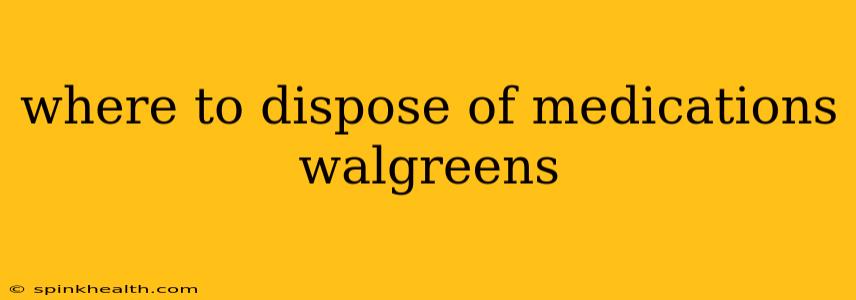Where to Dispose of Medications: A Walgreens Story (and More!)
Let's be honest, nobody likes having expired or unwanted medications cluttering up their medicine cabinet. It's a common problem, and the question "Where to dispose of medications?" is one many people grapple with. This isn't just about tidying up; it's about safety and environmental responsibility. This story starts with Walgreens, but it's a story that applies to everyone, everywhere.
Imagine Sarah, a busy mom juggling work, kids, and everything in between. She finds an old bottle of antibiotics at the back of her cabinet, long past its expiration date. She knows she shouldn't just toss it in the trash – that's risky for the environment and potentially dangerous for others. So, where does she turn?
Walgreens and Medication Disposal: What They Offer
Walgreens, like many pharmacies, plays a vital role in safe medication disposal. They often participate in local take-back programs, offering convenient drop-off locations for unwanted or expired prescription and over-the-counter medications. However, the specific services vary depending on location. It's crucial to check with your local Walgreens to confirm their participation and accepted medications. Don't assume they always have a program – call ahead!
What about other options besides Walgreens?
Now, let's consider other options because while Walgreens is a convenient option for many, it might not be for everyone.
Local Pharmacy Take-Back Programs
Many pharmacies, not just Walgreens, participate in these initiatives. It's worth contacting your local pharmacy (CVS, Rite Aid, independent pharmacies, etc.) to see if they offer a medication disposal program. They are often the easiest and most convenient option.
DEA National Take-Back Events
The Drug Enforcement Administration (DEA) sponsors nationwide drug take-back events several times a year. These events offer a safe and anonymous way to dispose of unwanted medications. Check the DEA website for dates and locations near you. These events often involve multiple collection sites for wide access.
Household Hazardous Waste Collection Sites
Many communities have designated facilities for disposing of household hazardous waste, which often includes medications. Contact your local waste management department or search online for "household hazardous waste disposal near me."
Mail-Back Programs
Some pharmaceutical companies offer mail-back programs for specific medications. These programs usually provide pre-paid envelopes and instructions for safe mailing. Check with the manufacturer of the medication for this option.
What Medications Can I Dispose Of?
This often varies depending on the program. However, many programs accept:
- Prescription medications: Pills, capsules, liquids.
- Over-the-counter medications: Pain relievers, cold medicine, etc.
- Pet medications: It’s important to check with the disposal site as some programs may have specific requirements.
It's usually better to not dispose of needles, sharps, and other hazardous materials at the same time as medications; separate programs may exist for these items.
What about liquids and patches?
Liquid medications and patches can often be disposed of through the same programs but may require specific instructions. It's important to always follow the guidelines provided by the specific disposal program. Check with your local Walgreens, pharmacy, or the DEA for these specific instructions.
Why is Proper Disposal Important?
Improper disposal of medications poses significant risks:
- Environmental contamination: Medications can leach into waterways and soil, harming wildlife and potentially contaminating drinking water.
- Accidental poisoning: Children or pets might accidentally ingest discarded medications.
- Drug diversion: Discarded medications can fall into the wrong hands, contributing to drug abuse.
By responsibly disposing of medications, we protect our environment and our communities. Sarah, by finding the appropriate disposal method, ensured her family's safety and contributed to a healthier planet. Knowing where and how to dispose of medications is a crucial part of responsible medication management for everyone.

